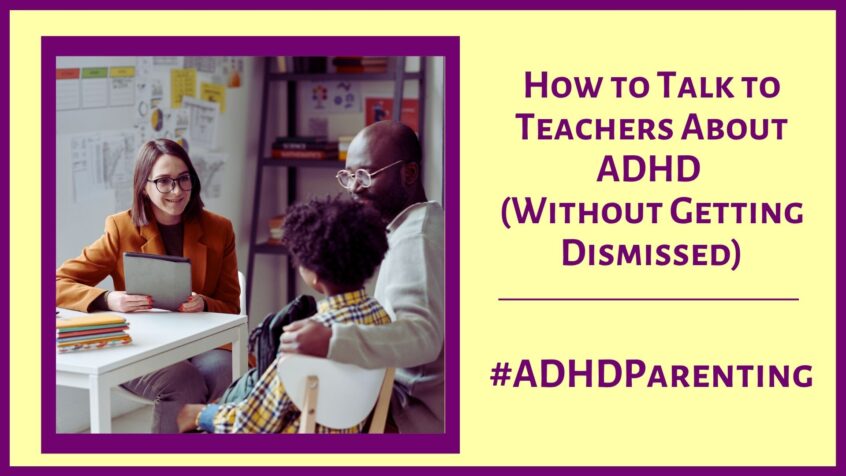How To Talk To Teachers About ADHD
(Without Getting Dismissed)
You walk into the classroom or hit “send” on that carefully worded email, hoping this time your concerns about your child’s ADHD will be met with curiosity and collaboration.
Instead, you get the look. You know the one. The polite nod. The tight smile. The “Well, I don’t really see those behaviors here…”
Cue the frustration. The self-doubt. The urge to scream into a pillow (or five).
If you’ve ever left a conversation with a teacher feeling unheard, dismissed, or like you were somehow asking too much just by naming your child’s needs—you’re not alone. Advocating for a kid with ADHD can feel like trying to explain quantum physics in emoji form. Teachers are often overwhelmed and undertrained in neurodivergence—but that doesn’t mean your concerns don’t matter.
The good news? With a little prep, some strong-but-kind language, and a few go-to phrases in your back pocket, you can have conversations with teachers that lead to support—not shutdowns. Let’s chat about how.

Step 1: Get Clear on What You Want (and what you don’t)
Before you send an email, schedule a meeting, or corner a teacher during pick-up, take a beat. What are you actually hoping will come out of this conversation?
It’s easy to go in carrying a whole backpack full of frustration, anxiety, and “why is this still happening?” energy (understandable, by the way). But without a clear ask, the conversation can easily drift—or derail.
Are you looking for specific classroom strategies? A change in tone? Better communication? Or maybe you just want your kid to stop being seen as “the problem.” (Fair.)
Here’s how to prep yourself:
-
Name 1–2 specific goals. Keep it manageable and focused—this isn’t your only shot.
-
Be ready to explain how ADHD actually shows up for your child. Not the textbook version—the real one: the perfectionism meltdowns, the zoning out, the blurting, the “won’t do it unless I’m hovering.”
-
Anticipate what you’re not asking for. (No, you don’t expect the teacher to become an ADHD expert overnight.)
You’re setting the tone. Clear, calm, and focused beats “please fix everything” energy every time.
Step 2: Set The Stage For Collaboration, Not Confrontation
I get it. You’ve probably had at least one experience where you felt like you were talking to a brick wall. It’s tempting to show up ready to fight—but the goal isn’t to “win.” The goal is support for your kid.
Even when you’re frustrated (especially when you’re frustrated), it helps to approach the conversation like you’re on the same team. Because ideally, you are.
Try this shift:
Instead of “They’re not doing enough,” try:
“Here’s what we’ve noticed at home and what’s helped—can we work together to try something similar here?”
Teachers aren’t always trained in ADHD beyond the basics, and they may not realize that what looks like defiance is actually dysregulation—or that your child can’t just “try harder.”
Some tips to keep things on track:
-
Lead with curiosity. “Have you noticed…” goes a lot farther than “Why haven’t you…”
-
Acknowledge their efforts (even if you’re gritting your teeth a little).
-
Use shared language like “support,” “tools,” or “working together” instead of “accommodation” or “diagnosis” if that seems to put them on edge.
-
Watch for red flags. If they say things like “We don’t treat kids differently here,” you may need to gently—but firmly—redirect. (Pro tip: this is where having a script helps.)


Have A Script – But Stay Human
When you’re heading into a potentially tough conversation, having a script or a few go-to phrases can be a total game-changer. It helps you stay focused, calm, and way less likely to spiral when the teacher says something like, “Well, all kids have trouble paying attention sometimes.”
Here’s how to use a script without sounding scripted:
-
Use phrases that feel natural to you, like:
-
“Here’s how ADHD shows up for my child day-to-day…”
-
“We’ve found that [insert strategy] works really well—could we try something similar here?”
-
“When [behavior] happens, it’s usually a sign they’re overwhelmed or dysregulated—not being defiant.”
-
-
Practice them ahead of time, even if it’s just muttering them while folding laundry or walking the dog.
-
Bring notes—it’s okay! You don’t need to memorize everything. You’re modeling advocacy and self-regulation, which is kind of badass, honestly.
And when (not if) you get a dismissive comment like “I don’t really see that in class” or “She seems fine to me,” have a calm response ready:
-
“That’s good to hear! At the same time, we’re seeing some big challenges outside of school, and I’d love to partner on strategies that support her across settings.”
Scripts give you a strong foundation—but you still get to show up as your warm, thoughtful, fierce-parent self.

Talking to teachers about ADHD shouldn’t feel like walking a tightrope while juggling flaming advocacy torches—but let’s be real, sometimes it does.
You’re not being “that parent.” You’re being the parent—tuned in, informed, and showing up for your kid even when it’s hard. And that matters. Every conversation you have plants a seed—for understanding, for support, and for a school environment where your child can actually thrive, not just survive.
You don’t have to do it perfectly. You just have to keep showing up, with clarity, compassion, and maybe a few well-rehearsed lines in your back pocket.
Need help finding those words?
Grab my free download: “Scripts for Hard Conversations With Teachers”—so you can feel more confident, calm, and clear the next time you speak up for your child.
You’ve got this. And I’ve got your back.
Questions? Feel free to send me an email at Kat@AllBelong.com and let’s chat!

 Don’t Delay Joy
Don’t Delay Joy
Kat Sweeney, MCLC


